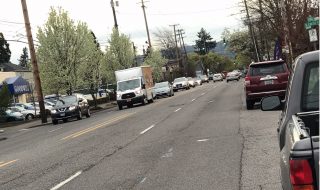
(Photo: Jonathan Maus/BikePortland)
The Oregon Transportation Commission (OTC) will make an important decision at their meeting on Tuesday (12/1). As we shared last week, the Oregon Department of Transportation is asking the OTC to approve how $2.2 billion in transportation funds should be allocated in the 2024-2027 timeframe. It’s the first step in the process to update the “STIP”, the Statewide Transportation Improvement Program.
In the weeks and months leading up to tomorrow’s meeting, ODOT staff presented the public with five funding “scenarios”. While most of the funds are already spoken four, about one-third or $600 million of the ($2.2 billion) total is at play in this allocation debate. While the lines between them often blur, the categories these funds can be placed i are “Fix-it” (maintenance), “Enhance” (new highway projects), “Safety” (focus on injury/fatality reduction), and “Non-highway” (bicycle, walking, and transit-focused projects).
Advertisement
With climate change on everyone’s mind, many groups urged the OTC to adopt the Non-Highway scenario because, according to ODOT analysis, it would have the largest positive impact on reduction of greenhouse gas emissions. Or, in the words of the Oregon Bicycle and Pedestrian Advisory Committee (OBPAC) Chair Hau Hagedorn in a letter to the OTC dated November 20th, “This is the only option that focuses major investments in the areas that will allow ODOT to make measurable progress on reducing greenhouse gas emissions and improving multimodal mobility while addressing serious social inequities centered around transportation options.”
Opting for the Non-Highway scenario would not lead to the reforms and outcomes many of us dream about at ODOT, but it would signal that the OTC was serious about pushing ODOT in a different direction.
Last week ODOT staff came out with two scenarios they’ll recommend to OTC members on Tuesday. According to ODOT’s letter to the OTC dated November 24th, the new “hybrid” scenarios are based on their read of public feedback and, “seek to balance funding across categories and outcomes across the goals to minimize negative impacts.”
Advertisement
The scenarios are named “Hybrid 1: Non-Highway/Fix-It” and “Hybrid 2: Non-Highway/Enhance”. Both would boost spending in the Non-Highway category by at least 50% over the existing “baseline” scenario and only differ in how much they allocate to Fix-It and Enhance categories. Hybrid 1: Non-Highway/Fix-It would add no new funding for Enhance projects and would increase Fix-It spending by 3% over current levels. Hybrid 2: Non-Highway/Enhance would boost Enhance (highway) funding by $200 million, including $90 million in discretionary funds.
These hybrid options differ substantially from the Non-Highway scenario pushed for by OBPAC and advocacy groups like Oregon Environmental Council, Bike Loud PDX, and others. The original Non-Highway scenario would have increased spending in the Non-Highway category by 130% over the baseline and reduced Fix-It by 17%. Because these hybrid scenarios are new, they haven’t been ranked against ODOT’s goals and outcomes.
The OTC meeting starts at 9:00 am on Tuesday (12/1). The 2024-2027 STIP decision is scheduled to begin at 12:50 pm. See the OTC website for more details.
— Jonathan Maus: (503) 706-8804, @jonathan_maus on Twitter and jonathan@bikeportland.org
— Get our headlines delivered to your inbox.
— Support this independent community media outlet with a one-time contribution or monthly subscription.



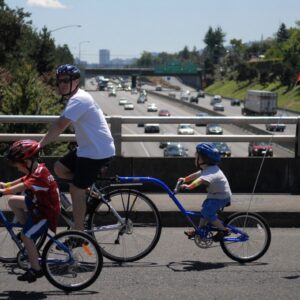
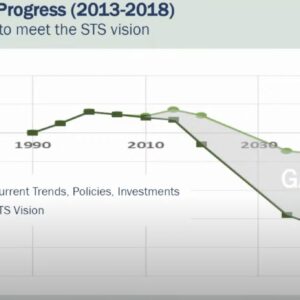
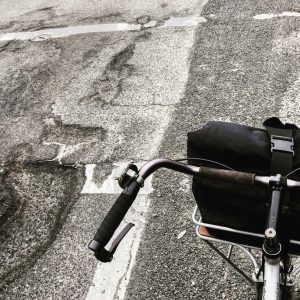
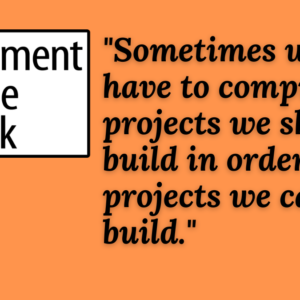
Thanks for reading.
BikePortland has served this community with independent community journalism since 2005. We rely on subscriptions from readers like you to survive. Your financial support is vital in keeping this valuable resource alive and well.
Please subscribe today to strengthen and expand our work.
They forgot to model the scenario where they don’t spend any money at all and let the whole road system go to pot. I bet that would help on the climate items to no end.
The names say it all. Expanding highway capacity = “Enhancement.” Expanding transit = “Sacrificing scarce highway expansion funds.” Reminds me of Metro’s push-polling early in the Get Moving process.
This is honestly worse than not listening to public feedback. They don’t like what they hear (most people, including local municipalities, want the non-highway option), so they take that off the table and say you can have a little bit of that, but then choose one of the two things we wanted you to choose.
Also do you know if the hybrid scenarios were part of the packet revision? If you had to sign up for comment by Wednesday and they switched the packages, that’s bad even by ODOT standards.
Is there any EVIDENCE that any of these plans will substantially reduce green house gas emissions?
Mostly empty buses burning diesel have far higher emissions than an SUV and any emission reductions associated with cycling requires mode share increases. Given that bus and bike mode share are plummeting in areas with the best options why would anyone believe that these tiny amounts of funding will have a significant impact on emissions statewide?
Infrastructure crumbs will not change the fact that driving is incredibly convenient, heavily-subsidized, deliriously addictive, and socially-reinforced. To address the climate crisis we need bans not cynical incrementalism.
So far all these “non-highway” options have done nothing more then impede traffic, agitate drivers, create more road rage, and more hatred towards bicyclists and pedestrians.
Excellent. Now when they get a few complaints about these options, they can just create a new hybrid of the hybrids, let’s call it Hybrid 3: Non-highwayeenhance/Fix-it. Curiously, the funding levels will be exactly those of the baseline, but it will reflect public feedback and be a hallmark of effective public outreach!
The four categories should be simplified to two– “POLLUTE MORE” or “POLLUTE LESS”
At this point I would recommend everybody send a bunch of angry emails to the State Committee on Transport at its is meeting December 8th. ODOT put out the agenda last week and includes a bunch of topics that may be voted on in the next state legislative session. No additional documentation has been provided as to what the ODOT staff will be recommending. But the STIP will hold up the entire state, not just Portland.
I’m not surprised Van Brocklin has come up with his own scenarios. Governor Kate Brown should remove him from the committee for ethical violations in using ODOT staff to advance his personal causes on non-public scenerios. He’s an attorney and should at least have his license revoked for egregious acts of state wide subterfuge and conspiracy to divert state transport funding for personal goals.
He is hell bent on building a Frog Ferry and I don’t see any of those scenarios recommending water taxis for the elite in Lake Oswego. I’m not opposed to water taxis but at what expense and who are they serving? I mean honestly Robert Van Brocklin, this is the second clusterduck of state wide communications (ie Rose Quarter).
I would argue Brown and Kotek could be gambling on another walkout for fraudulently misrepresenting scenarios that they never intended to endorse. How much time and energy did the public spend on reviewing these scenerios? Wasted time. Again. Just like at the Rose Quarter, botched communications, secret meetings and secret funding buckets.
Somebody tell Senate Minority Leader Girod and he’ll send out another nasty PR release. Maybe even another walkout….? Bike activists and Republicans organizing together? That is what ODOT lies has forced us into.